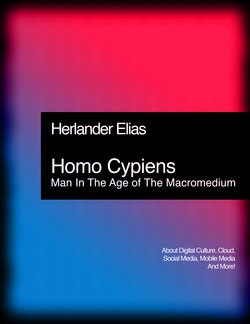Читать книгу Homo Cypiens - Herlander Elias - Страница 27
На сайте Литреса книга снята с продажи.
9.The Moving Frontier
ОглавлениеThe contemporary man is a homo cypiens. He confronts the world of digital media and invests in his education, in his know-how and in his image, because he also deals with the economy of the immediate, as well with the information of the macro-medium that is the digital and because he knows that the future is ours. However, the homo cypiensdeals with another problem which is the fact that all the changes in his surroundings resemble to some kind of moving frontiers. As everything quickly changes we change by drag too. Change has become a dictatorship of the movement, an oppressive regime in which we are supposed to evolve, to move, mutate and migrate from one point to another. Our normal state is the transformation state, only that one when we stop for thinking is an extraordinary state. Normal, normal is to be set in motion, to be a mobile population using mobile media, such as PC tablets, smartphones and wearables. The whole world looks like a fitness competition: the human being is always at stake, always investing, always looking for something and learning, rarely based in the same place. We became totally "touristified" and became foreigners in our own country. The very notion of frontiers in motion also makes us question the concept of country. A country used to be a geopolitical territory with an army, aristocracy, people and natural resources. This was so in the old days. Now, a country has no defined legal borders other than technology. We reached a historical level where we can sell, give up its resources, the aristocracy can migrate and the people are the only constant in a world where frontiers have lost their traditional meaning.
The moving frontier is also the frontier of technology, digital and macro-medium. Now, everything is interconnected, machines and people, country with country, and media with media. The future belongs to the frontier that will continue moving, the one that does not stagnate and that is able to respond to the new challenges of mobile contemporaneity. This means that mobility has extinguished territories and countries, cities and languages. The machines of past centuries are not the determining machines of this twenty-first century. The twentieth century was devoured by world wars, expansion of cities and the tyranny of automobile and consumerism. The 21stcentury is a moving frontier, marked by sophisticated technology, mobile jobs, macro-media, youth entrepreneurship, renewable energy and light transport. Heavy machines dominated the 20thcentury which is opposite to light and environmentally friendly machines that dominate the 21stcentury.
If we reverse the question of the moving frontiers we have the movement of frontiers. This is where we also stand, in the condition of dealing with a changing reality, where we are forced to move, to run, to compete, to act, to seek and to undertake. One cannot at present stand still. The movement is a new "tyrannical" code that is made possible by the acceleration of the technique. The movement is us and the countries that deal with images of the future, narratives that give us glimpses of cities to build, magnificent places to build, products and vehicles that defy our imagination.
The moving frontier is something that has become the new normality. One does not intend to turn back because if we stop, others will not and then we are misled. The only response to the obstacles and walls is to open up even more lines of flows, after all the late and objectivist capitalism we know, once merged with digital media information, has become an unstoppable machine that aims to turn all sectors into financial markets. Capital is a flow machine. In fact, capital is the flow of flows because it relies on money, value and information, on goods and products, services and loans, investments and bonds. The flow of flows cannot have any obstacles to its passage. All the dynamic territory must be territory of capital, information, money. The whole moving frontier shows a boundary zone, an area in which the future is programmed, the future as an investment, but this time no longer as a political impetus but as a corporate goal. Today, the future lies in dynamic corporations. Franchise structures have replaced political systems, even governments are not able compete with board committees of large corporations, and countries' borders are in crisis while media and capital borders are in motion. Suddenly, from one moment to another, a person may become wealthy through a networked computer or may fall in poverty.
The new totalitarianism of information and capital alters the nature of the individual today. The new instruments are the flow of capital and viral information. The future belongs to those who manage to win in the economy of the immediate using these same weapons, to get successful and not to fall into oblivion. One of the negative sides of this new reality shows that it is much easier to fall into oblivion now than in the twentieth century, because there are more protagonists, celebrities, myths, narratives, brands and interests moving in this frontier of information and alluring capital.
